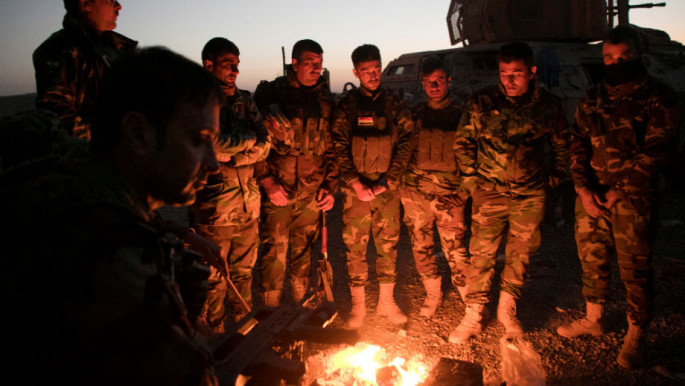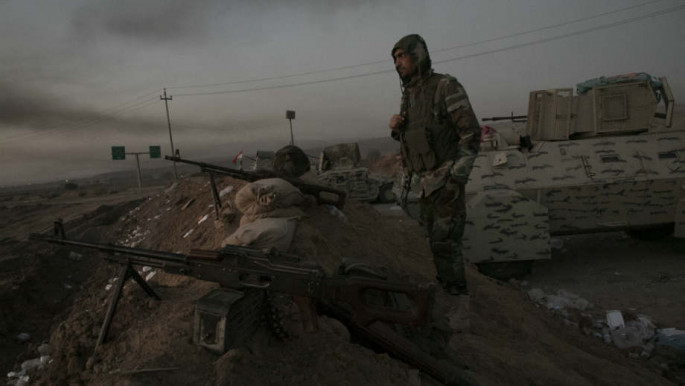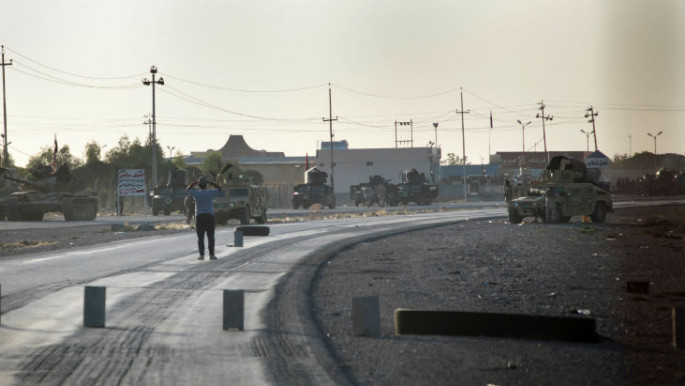
Behind the story: On the Kurdish frontlines at Altun Kompri
When we arrived at the Altun Kompri checkpoint on Friday morning, the sun was still hiding behind the mountains.
A group of Peshmerga soldiers stood huddled around a small fire brewing their morning chai. They welcomed us and poured us each a glass. The ritual of the morning chai is one of my favourites in this part of the world - it slows things down, it takes you away from the larger narrative and brings you be back to the men and the moment.
It's a dose of humanity when, in war, so much seems inhuman.
There is plenty to be said about who and what any fighting force represents. There are mountains of context, history and deep politics involved. Aside from these massively important details, there is an undeniable truth that I've seen on both sides of this fight - the profound kindness of its soldiers.
Having lived with both the Peshmerga and the Iraqi army, it is clear that there is much that polarises and separates the two, but in their affinity to be hospitable and their willingness to share, a blind man would find it hard to make a distinction.
 |
| Kurdish Peshmerga fighters warm themselves by a fire at the Altun Kompri checkpoint in the hours before Friday's battle [Adam McCaw/AMYKMedia] |
While sipping on tea, I began to speak with Colonel Sergat Mohammad Youssef. Very quickly it was clear he was a man of great resolve and that his men held him in high regard.
"They are very close," he told us, pointing south towards Kirkuk and the Iraqi line. "There will be a fight today."
Two things became clear as he spoke - his determination to hold this front, and a disappointment in the lack of American military presence. He told us that his men were prepared to die here. After the Kurds lost Kirkuk to Iraqi forces, he says the pride of the Peshmerga is at stake. This is something they would fight and die for.
 |
After the Kurds lost Kirkuk to Iraqi forces, he says the pride of the Peshmerga was at stake. This is something they would fight and die for |  |
The colonel sat sipping his hot beverage on a berm that would later be used as cover. Only a few hours later, I remember seeing the seat he cut into the dirt as I ran by to hide from the bullets zipping overhead.
Since the loss of Kirkuk the question, "where is America?" has come up often. "The US and the Kurds used to be best friends," Youssef said. "We fought for the US, we fought Daesh [Islamic State], al-Qaeda and Saddam Hussein… We don't trust America anymore. Now the mountains are our only friends."
 |
| The wait before the dawn: A Kurdish Peshmerga stands guard at Altun Kompri, waiting for the approach of the Iraqi army and the PMF [Adam McCaw/AMYKMedia] |
Photographer Adam and I drove south from the Altun Kompri checkpoint - which marks the southern border between the autonomous region of Kurdistan from the rest of Iraq - to find the advancing Iraqi forces.
We drove through a Peshmerga scouting position between the Kurdish and Iraqi lines. The post was held a few Humvees and a handful of men. The soldiers here, even though understaffed and undersupplied, spoke with the same purpose as the colonel.
"We don't give a sh*t about Hashd, let them come! We are excited to fight them," said Niehaad Sdeq Mohammad, a Warrant Officer for the PAK, the Iranian counterpart to the Iraqi Peshmerga.
Mohammad has been fighting in Iraq since 2014, in efforts to stop the Islamic State group from spreading throughout the Middle East. He had fought hard in the three years, he said, and the look in his eyes backed it up.
Mohammad too had something to say about the American absence. "They sold us out," he said, shaking his head. "The Americans lied to us. The Kurds helped them and now they leave us."
He began telling us the history of Kurdish and American relations. You could feel the disappointment and sense of abandonment in his voice. It is a sentiment many Kurds have developed in recent weeks.
 |
They sold us out... the Americans lied to us. The Kurds helped them, and now they leave us |  |
After sharing breakfast with Mohammad, we wished him and his men a safe day and continued driving south.
As we approached the boundary line separating Iraqi and Kurdish fighters, we pulled over and watched as fixer Makeen approached a line of US-supplied Iraqi armoured vehicles and tanks. The soldiers from Baghdad shouted at him. He threw his hands in the air, but kept moving forward.
"Stop or we're going to shoot you!" they screamed. We watched in shock as Makeen, a Kurd, stood with his hands raised to the sky trying to convince the Iraqi army to let us cross the front.
 |
| Local fixers such as Makeen are the unsung heroes of journalism who often risk life and limb to help reporters reach a story [Adam McCaw/AMYKMedia] |
To put it simply, that turned us around and we returned the way we had come. We stopped again at the forward scouting outpost. Soon after arriving, men started screaming and ran to their positions. As the scene began to unfold, we crouched behind a concrete wall. Suddenly, a giant thunderous sound cracked, and my head shot to the side as my helmet was hit with a piece of flying concrete, my ears rang and my eyes were full of dust.
A mortar landed no further than 15 metres from where we crouched and in the silence of my deafened ears, I turned and ran with several soldiers.
Looking ahead, I found Adam and Makeen who motioned for me to head back to the car. Getting in, my ears still screaming from the blast, the tires screeched as we drove off.
Makeen has always driven fast - we joke that he was a racecar driver in a former life - and I was grateful for it this time. We sped back to the main Peshmerga line as trucks laden with men and mounted turret guns piled up in a line to get behind the fortified position.
Immediately, gunfire from both sides erupted. The Peshmerga began to barrage the Iraqi front with mortar fire and its heavy artillery that was strategically placed on the mountains to the east and west. The fight went from zero to ten in a heartbeat.
| |
| Watch now: Our reporters find themselves a little too close to the front line [AMYKMedia/TheNewArab] |
Men flooded against the dirt mound marking "the last line", of which the colonel had earlier spoken. Iraqi mortar fire reached out and began making puffs of dirt and smoke in the surrounding fields. Adam and I scrambled around the men and vehicles and started photographing the soldiers doing what they were trained for.
This was the first time we had seen the Peshmerga in action. American and Canadian forces had trained them - I wouldn't call it structured, but, unlike our time with the Iran-backed PMF militia in Hawija, the Kurds definitely had intention in their fighting.
The Peshmerga fought with tangible energy, rushing to supply the mortar men, cycling in and out of the forward-most positions when they needed to reload or stay fresh.
The bullets began to get closer; their sound went from a "clack", to a "zip". The Iraqi forces were beginning to make a push forward. You could start to see the crown of their vehicles break the arch down the road ahead. A huge boom echoed through the open fields while white smoke bellowed up from in front of us - the Kurds had blown up the bridge on the road ahead of the checkpoint.
Cheers and celebratory gunfire spread through the line. Momentum is a powerful thing in battle; morale changes outcomes. "War is not only a matter of equipment, artillery, group troops or air force," says Chiang Kai-Shek, the military commander and philosophy-minded statesmen of the Republic of China. "It is largely a matter of spirit, or morale."
The clash kept up like this for several hours. Eventually, the mortar fire grew closer and closer. A commander grabbed me by the shoulder and, pointing away from the fight, looked me dead in the eye - and shouted: "You go, now!"
 |
| Peshmerga fighters have sacrificed much in the fight against the Islamic State group, but are willing to fight to the death against Baghdad's troops [Adam McCaw/AMYKMedia] |
Taking his words to heart and feeling that the intensity of the battle was picking up yet further, the team started to move towards the car. Running with our heads down, mortars dropped around us. Another photographer, who was on the line, saw our move and ran in tow. We all got to the car and drove a few minutes north to reassess and make a plan.
Just as soon as we pulled over, DShK rounds - a heavy Soviet machine gun - started to drop around us, dancing along the gravel like stones skipping across a pond. No further words were needed; silently and with heads down we rushed back to the car and drove off.
The clash ended without any ground being lost by Kurdish forces, which was a de facto victory for them. As we drove north, back to Erbil, I could hear the colonel's words, "now the mountains are our only friends". His words echoed in my head as I looked upon the mountains of which he spoke.
Adam McCaw and Joachim 'Yomi' Kleinmann are a photography and print journalism team covering areas of conflict.
Adam spent several years in the US Army Special Forces and has a working knowledge of deep infrastructure in the Middle East. Yomi has a background as an EMT, giving the team unparalleled experience in hostile environments.




